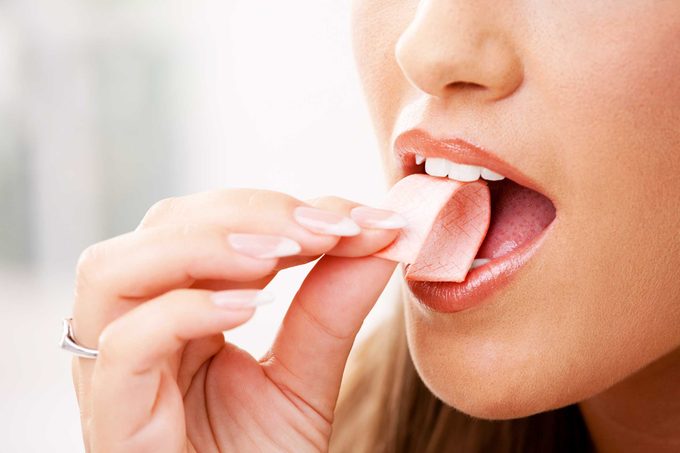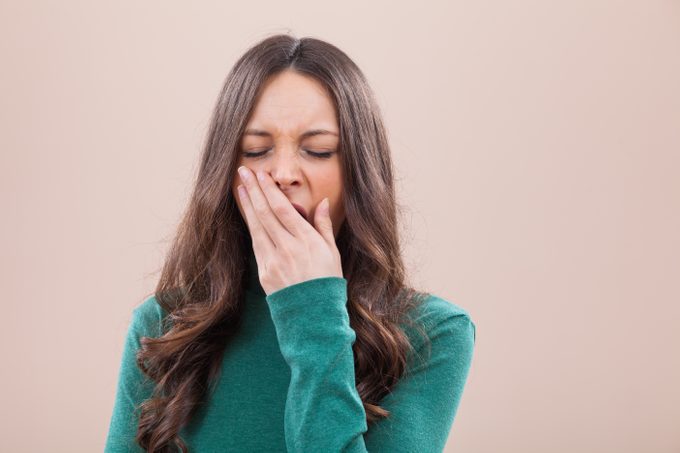14 Ways to Ease Jaw Pain
Updated: Jul. 02, 2020
People who have jaw pain related to the temporomandibular joint (TMJ) can have what is known as temporomandibular disorder (TMD). If you have TMD, here are some steps you can take to ease the pain.
Our editors and experts handpick every product we feature. We may earn a commission from your purchases.
If you have pain when you chew or yawn—or even when you say “temporomandibular disorder”—you know the discomfort of TMD. The temporomandibular joint (TMJ) is so named because it connects the mandible (or lower jaw) to the temporal bone at the side of the head. Problems begin when the muscles and ligaments around the temporomandibular joint become tight and inflamed, resulting in TMD.
TMD symptoms include pain in the temporomandibular joints, a clicking or popping noise when using your mouth, headaches, and aching in your neck and shoulders. “Research shows that there are many causes of TMD,” says Karyn Kahn, DDS, a specialist in temporomandibular disorders at the Cleveland Clinic, in Cleveland, Ohio. “There may be a history of grinding and clenching of teeth or an acute traumatic event to the jaw.” Less often, people get TMD as a result of arthritis.
If the pain is infrequent and not too severe, there are several remedies you can try at home, starting with:
Warm and cool
When you feel an occasional sharp pain in your jaw joints, apply a pair of cold packs. “The application of cold helps numb the pain and reduce acute inflammation,” says Dr. Kahn. Wrap a couple of soft packs in thin towels and hold them on both sides of your face for about 10 minutes or so (not longer than 20 minutes, though, or you could cause mild frostbite). Repeat every two hours as needed. If you’re experiencing a dull, steady ache rather than sharp pain, heat is better—and more soothing—than cold. It increases blood circulation to the area and relaxes jaw muscles. Soak a couple of washcloths in warm water and hold them to your face for 20 minutes or so. You’ll want to run them under hot water a few times to keep them hot. (Here are 6 surprising jaw pain causes to watch out for.)
Massage
 Gently massage the areas around your jaws to relieve muscle tightness and enhance blood flow to the area. Several times a day, open your mouth, then rub the muscles by the ears near your temporomandibular joints. Place your forefingers on the sore areas, and swirl them around, pressing gently, until the muscle relaxes. Close your mouth and repeat the massage.
Gently massage the areas around your jaws to relieve muscle tightness and enhance blood flow to the area. Several times a day, open your mouth, then rub the muscles by the ears near your temporomandibular joints. Place your forefingers on the sore areas, and swirl them around, pressing gently, until the muscle relaxes. Close your mouth and repeat the massage.
With a clean forefinger, reach in your mouth until you can feel the sore muscles that are inside. Pressing firmly with your forefinger, massage one side, then the other, getting as close to the joints as you can.
Finally, massage the muscles on the sides of your neck. Those muscles don’t directly control your jaw, but by massaging them you help to reduce the tension that contributes to jaw pain. (While you’re at it, learn the art of self-massage.)
Avoid slouching
When you’re sitting in a chair most of the day, it’s especially important to sit up straight rather than lean forward. Your back should be well supported. Make sure your chin doesn’t jut out in front of your body. If you are angled forward, you’re straining your neck and back, and that creates jaw pain.
Use a document holder when you type so you don’t have to crane your neck or lean forward to read the text. And if you spend a lot of time on the telephone while you’re using your hands for other tasks, get a headset. Cradling the telephone receiver between your shoulder and cheek puts a lot of strain on your neck and jaw.
Try a mouthguard
If nightly teeth grinding or clenching is contributing to your TMD, try wearing the type of inexpensive mouth guard that can be found in any sports store. “Over the counter occlusal guards are used to lessen wear on the teeth,” says Dr. Kahn. This isn’t as good as a custom-designed mouth guard that dentists can provide. But even a sports-store product can be molded for a good fit. Follow the package directions to make it fit your mouth.
Watch what you chew
 Try to steer clear of extremely crunchy and chewy foods, such as apples, carrots, beef jerky, and hard dinner rolls. You want to spare your jaws from overwork, particularly when the aching and clicking are severe. What you want are soups, pasta, and other easy-to-eat foods. Also, don’t take big bites: Try cutting your food into smaller portions, so you don’t have to overwork your jaw. And avoid chewing gum, as well, suggests the National Institute of Dental and Craniofacial Research. Every time you chew, you tense your jaw muscles and give your temporomandibular joints an exhausting workout.
Try to steer clear of extremely crunchy and chewy foods, such as apples, carrots, beef jerky, and hard dinner rolls. You want to spare your jaws from overwork, particularly when the aching and clicking are severe. What you want are soups, pasta, and other easy-to-eat foods. Also, don’t take big bites: Try cutting your food into smaller portions, so you don’t have to overwork your jaw. And avoid chewing gum, as well, suggests the National Institute of Dental and Craniofacial Research. Every time you chew, you tense your jaw muscles and give your temporomandibular joints an exhausting workout.
Skip tea and coffee
Caffeine and TMD don’t go well together since caffeine can increase muscle tension. Switch to decaffeinated drinks.
Spike your OJ
Add 500 milligrams of powdered calcium and 250 milligrams of powdered magnesium to your morning orange juice. There are no scientific studies showing that the combo is a remedy for TMD, but it may help your jaw muscle relax. You can take capsules if you can’t find the powders, but the powdered form—which dissolves quickly—is more easily absorbed by your body. But keep in mind: Magnesium and calcium interact with several medications, herbs, and supplements. And they can affect your heart and blood pressure, so be sure to ask your doctor if you should take them.
Resist yawning
 If you see someone yawning, resist the temptation to join in. Under those circumstances, it’s extremely difficult to stifle a yawn, but that’s exactly what you want to do if you have TMD. A big, wide yawn is sure to cause pain. If you can’t stop a yawn, try to suppress it by opening your mouth as little as possible.
If you see someone yawning, resist the temptation to join in. Under those circumstances, it’s extremely difficult to stifle a yawn, but that’s exactly what you want to do if you have TMD. A big, wide yawn is sure to cause pain. If you can’t stop a yawn, try to suppress it by opening your mouth as little as possible.
Steps to help your jaw
- Avoid biting your fingernails or chewing on a pencil. Instead, find a non-jaw-related way to get rid of your nervous energy—such as fiddling with “worry beads” or twisting a paperclip.
- Sleep on your back or side. If you’re on your stomach, with your head turned to one side, the misalignment produces neck strain that’s transferred to your jaw.
- If you put in a lot of desk time, take a few minutes to hide out and meditate. Focus on the muscles in your face and neck, allowing them to relax and grow slack.
- Get 20 to 30 minutes of aerobic exercise at least three or four times a week. Not only does exercise reduce stress, it helps your body produce endorphins, which are its natural painkilling chemicals.
- When you’re under stress, make a point to not respond by grinding your teeth or clenching your jaw. If it helps, hold your tongue between your teeth to ensure that you don’t grind your teeth together.
- If you often carry a monstrous purse or briefcase on one shoulder, lighten your load. The weight throws your spine and neck out of alignment—indirectly contributing to jaw pain. If you absolutely need the heavy tote, move it from shoulder to shoulder as you’re walking.
When should I call a professional?
“Patients should seek routine dental care at least every six months,” says Dr. Kahn. “During these appointments ask your dentist if there are signs of grinding or wear on teeth. Periodic dental panorex [x-rays that include the temporomandibular joint] can detect early signs of TMJ bony changes and may indicate the need to take preventive measures before pain develops.”
For severe TMD doctors may prescribe muscle-relaxing drugs or, if you have inflammation, inject corticosteroids into the joints. A dentist can prescribe a customized mouth guard to wear at night to reduce clenching or grinding if that’s contributing to TMD pain.















